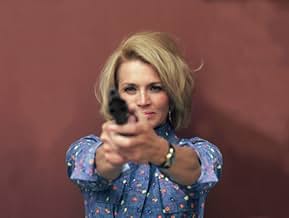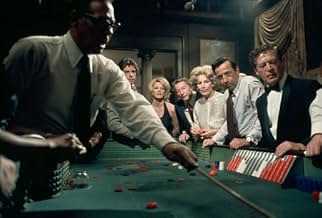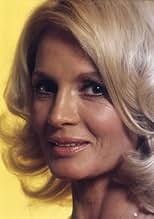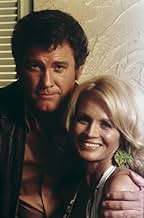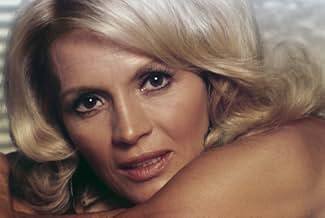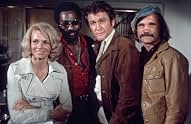Sigue al sargento "Pepper" Anderson, el principal policía encubierto de Los Angeles. Miembro de la Unidad de Conspiración Criminal, Pepper trabaja en el lado salvaje de la calle, donde se ha... Leer todoSigue al sargento "Pepper" Anderson, el principal policía encubierto de Los Angeles. Miembro de la Unidad de Conspiración Criminal, Pepper trabaja en el lado salvaje de la calle, donde se hace pasar por todo.Sigue al sargento "Pepper" Anderson, el principal policía encubierto de Los Angeles. Miembro de la Unidad de Conspiración Criminal, Pepper trabaja en el lado salvaje de la calle, donde se hace pasar por todo.
- Nominado a 7 premios Primetime Emmy
- 2 premios ganados y 15 nominaciones en total
Explorar episodios
Opiniones destacadas
In the Summer of 1975, not so long ago, this was the NUMBER ONE show on television, and was the TOP SHOW in many of the countries around the world in which it aired.
How many people know this? Today, almost nobody... Younger audiences haven't even seen it, or, in many cases, haven't even heard of it, or know it's success essentially inspired the advent of "Charlies Angels". (It was also TV's first successful drama series to feature a woman in the title role). When "Police Woman" premiered in fall 1974 it was, admittedly, a quite different show than it would end up four seasons later. Angie Dickinson was the slinky undercover cop, sexy but tough-- convincing on both fronts-- and the show was produced (in the beginning) with the very obvious idea in mind of doing something "good" and distinctive, while tossing in a dash of T&A in their for "kick".
Like with any show, in the very early episodes the series is trying to find it's identity, but by the last half of the first season, the show had taken on almost a cinematic sense of bigness that was REALLY working-- the show (at least for the standards of the day) had begun to feel like a movie, full of gravity and portend, decidedly not just another cop show and not just an undercover-hooker formula thing (although they didn't shy away from that). No wonder the show was, briefly, at the top of ratings at this time-- or in the summer reruns immediately following.
But the feminists, Goddess bless 'em, put a lot of pressure on the network about "Police Woman", unhappy with the go-go dancer assignments and the "oooo-ain't-she-sexy!" dialogue that sometimes permeated the program. They wanted the character de-sexualized... Perhaps one can understand their point about that, but all they seemed to see was Angie in spandex and fishnets, and some of their demands were rather odd (prior to the second season, they even demanded that "Pepper" only be shot by female assailants in the future.... Huh?!?!?... Since 99% of most gun violence is perpetrated by guys, this seemed a tad strange). In any event, as sophisticated and intelligent as "Police Woman" was becoming by the end of it's first year, it didn't really need the "sex-crutch" anymore anyway, yet excess caution was taken with the second year to "reign in" Angie's natural effervescent demeanor. Curiously, what turned-out happening was that the energy was sucked out of the star and the show very quickly, her character weakened considerably... and yet, the hooker assignments continued.
What?? Now we had the reverse of what should have happened.
Within 6 months "Police Woman" went from Number One in the Nielsen Ratings to, maybe, Number 30 (an unwise timeslot change didn't help). In fact, NBC kept moving the show so much one wondered if it was one of those 'let's-try-and-lose-it' type of corporate decisions.
Suffice it to say, the show never really recovered. Angie's confidence seemed surgically removed after the first year, and the scripts and direction followed suit; only about half the episodes from seasons 2 and 3 had enough energy and focus to really work, and even then there's a constant feeling of the program "holding back" --- or holding-back Angie. And season 4, the series' final, was largely a misfire... And in SUCH contrast to the dynamic, volatile first season--- well, it's like a completely different program.
And ever since a brief rerun period after it's initial network run, the show has been utterly buried--- like it never even existed!
How many people know this? Today, almost nobody... Younger audiences haven't even seen it, or, in many cases, haven't even heard of it, or know it's success essentially inspired the advent of "Charlies Angels". (It was also TV's first successful drama series to feature a woman in the title role). When "Police Woman" premiered in fall 1974 it was, admittedly, a quite different show than it would end up four seasons later. Angie Dickinson was the slinky undercover cop, sexy but tough-- convincing on both fronts-- and the show was produced (in the beginning) with the very obvious idea in mind of doing something "good" and distinctive, while tossing in a dash of T&A in their for "kick".
Like with any show, in the very early episodes the series is trying to find it's identity, but by the last half of the first season, the show had taken on almost a cinematic sense of bigness that was REALLY working-- the show (at least for the standards of the day) had begun to feel like a movie, full of gravity and portend, decidedly not just another cop show and not just an undercover-hooker formula thing (although they didn't shy away from that). No wonder the show was, briefly, at the top of ratings at this time-- or in the summer reruns immediately following.
But the feminists, Goddess bless 'em, put a lot of pressure on the network about "Police Woman", unhappy with the go-go dancer assignments and the "oooo-ain't-she-sexy!" dialogue that sometimes permeated the program. They wanted the character de-sexualized... Perhaps one can understand their point about that, but all they seemed to see was Angie in spandex and fishnets, and some of their demands were rather odd (prior to the second season, they even demanded that "Pepper" only be shot by female assailants in the future.... Huh?!?!?... Since 99% of most gun violence is perpetrated by guys, this seemed a tad strange). In any event, as sophisticated and intelligent as "Police Woman" was becoming by the end of it's first year, it didn't really need the "sex-crutch" anymore anyway, yet excess caution was taken with the second year to "reign in" Angie's natural effervescent demeanor. Curiously, what turned-out happening was that the energy was sucked out of the star and the show very quickly, her character weakened considerably... and yet, the hooker assignments continued.
What?? Now we had the reverse of what should have happened.
Within 6 months "Police Woman" went from Number One in the Nielsen Ratings to, maybe, Number 30 (an unwise timeslot change didn't help). In fact, NBC kept moving the show so much one wondered if it was one of those 'let's-try-and-lose-it' type of corporate decisions.
Suffice it to say, the show never really recovered. Angie's confidence seemed surgically removed after the first year, and the scripts and direction followed suit; only about half the episodes from seasons 2 and 3 had enough energy and focus to really work, and even then there's a constant feeling of the program "holding back" --- or holding-back Angie. And season 4, the series' final, was largely a misfire... And in SUCH contrast to the dynamic, volatile first season--- well, it's like a completely different program.
And ever since a brief rerun period after it's initial network run, the show has been utterly buried--- like it never even existed!
Here's another example of a higher plane of quality 70's crime drama. Police Woman has much more believable scenarios, and better actors, say to other shows around that time, or T.J Hooker, if you want another example. The casting was something I really liked with this show. What actually pi..es me off here, is that of the measly screen time of the great Charles Dierkop, the older moustached guy of the undercover squad. He was the killer/cop in that good sleazy exploitation pic, Roots Of Evil. Again, here was a show where you saw a lot of 'before they were famous' actors, one being T.J Hooker, himself. Of course, the foxy AD as the female cop heroine, one lady cop you'd really like to save you, probably the best female acting cop performance to other ones around that time. The t.v. show's music score, is something I probably remember most, about this great cop show, as I was only a nipper. Another 70's cop show, gone, but not forgotten.
While not the first show to depict a female police officer on tv, Police Woman was the first to show how she does it in an hour. The show, which ran for four seasons and has seen popularity in reruns and on dvd and streaming, stars Angie Dicksinson, once married to Burt Bacharach and whose daughter commited suicide at the age of 40, who is still alive and kicking at 88. The music is memorable and is one of the first TV shows to be distributed by Columbia Pictures Television, as Screen Gems in its previous form released the TV movie, which was a hit a year before. David Gerber produced the show, which did good in its first season but ratings fell due to changes in politics, speaking of which Gerald Ford loved this show but ABC cancelled it a year after Charlie's Angels became popular.
Hi, again, folks. It's me, Michael Reiter. Listen, This time it's about Angie Dickinson in Police Woman. I saw the show back in the seventies, when I was about 11 or so. By the time it was cancelled, I was 15 or so. By then, I was old enough to be titillated by beautiful women. . . Of course I am still that way now, but what the hey? Enjoy them when you get them. Any how, When they made this show, It was still the fashion for women to wear Polyester Leisure suits or some combination there of with tee shirts and or mock t-neck sweaters. That and a London Fog or worthy imitator, Lilly Trenchcoat. Those were the days, my friends. Onwards; Those were also the days of political Incorrectness, in every thing and seen every where. Given that It was just a scant four to eight years after the end of the sixties, when goofy fashions and goofier social behaviour/mores. I read in the preceding comment that there was a concern for political correctness by feminists over the "erotic" nature of the first season; Good God, Even then. The seventies were a fun and peaceful, wonderfully erotic and titillating time unless you happened to be unlucky enough to encounter some of the girls in your class, who were rabid Police Woman Fans. Than you were careful or you got hissed, yowled and cursed at.
Of course, during that time, actresses were bound and gagged, or what have you during the course of a story regularly and nobody questioned anything, because every body knew the difference between right, wrong and the ridiculously fine but obvious line between fact and fiction. What happened to those days?
Ah, Me.
Of course, during that time, actresses were bound and gagged, or what have you during the course of a story regularly and nobody questioned anything, because every body knew the difference between right, wrong and the ridiculously fine but obvious line between fact and fiction. What happened to those days?
Ah, Me.
After I graduated from college, had a job, I'd sit in my single-girl's apartment, watching this show about a single woman working. In 1977-1978, the network would show Policewoman, Kojak and another cop show after the late night news. Angie was right up there with the boys. That pretty much sums up her image. Pepper liked being one of the guys. The media focused on her sexy qualities, especially the first half of the first season, but Pepper really evolved into a great character. The topics were often ahead of their time. I remember one episode that began with Pepper and her boss watching that French dance act where the man slaps the woman around. Pepper didn't like it. Darned if a new neighbor in her apartment complex stops by, showing signs of being slapped around. Spousal abuse! This was before Farrah Fawcett starred in the TV movie, "The Burning Bed", the TV movie that brought this issue to the mainstream. In two other episodes, Pepper supported the wife or ex-wife of one of her coworkers diagnosed with cancer. The '70's were a decade when women ceased to hide their medical ailments, including disfiguring ones like breast cancer. These episodes showed that the Police Woman supported women as well as men. Back to Pepper's apartment, it was one a city employee could afford, unlike the spectacular, designer decorated living quarters one usually sees like in Will & Grace, Living Single, etc.
¿Sabías que…?
- TriviaAngie Dickinson admits in interviews that making this show was a bad experience, and she would not do it again if she had it over to do again.
- ConexionesFeatured in The 27th Annual Primetime Emmy Awards (1975)
Selecciones populares
Inicia sesión para calificar y agrega a la lista de videos para obtener recomendaciones personalizadas
- How many seasons does Police Woman have?Con tecnología de Alexa
Detalles
- Fecha de lanzamiento
- País de origen
- Idioma
- También se conoce como
- Police Woman
- Locaciones de filmación
- Productoras
- Ver más créditos de la compañía en IMDbPro
Contribuir a esta página
Sugiere una edición o agrega el contenido que falta

Principales brechas de datos
What is the French language plot outline for La mujer policia (1974)?
Responda

